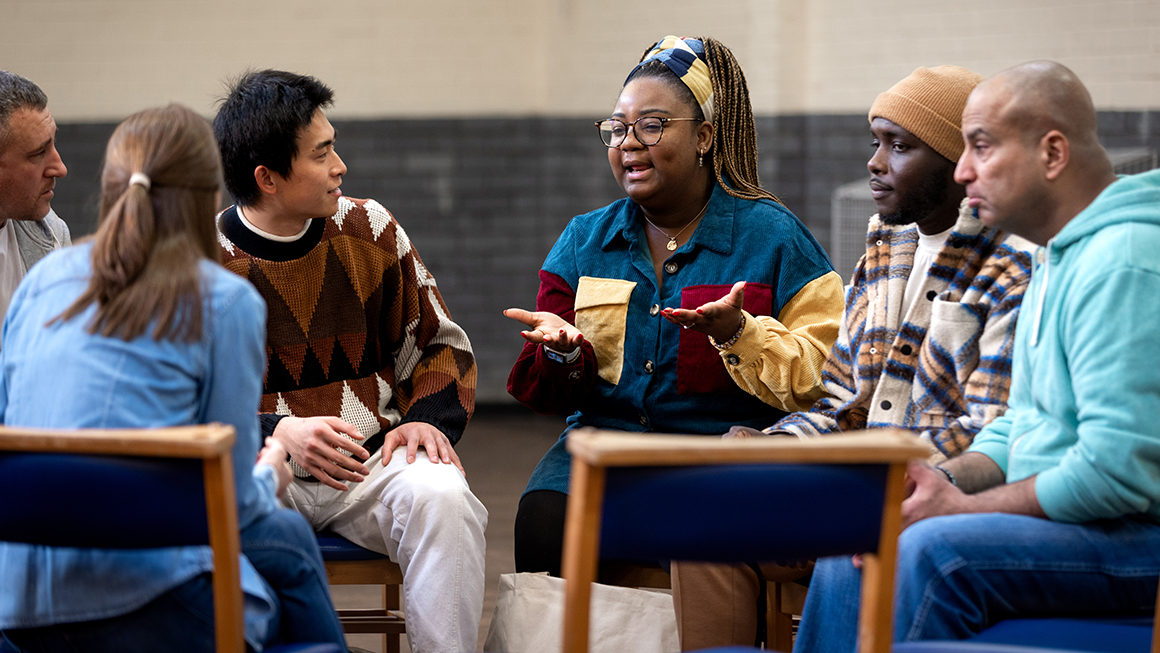
Much of the data that policymakers rely on to shape decisions and funding for rural communities is incomplete and does not reflect the knowledge, priorities, and assets of rural communities. This has major consequences for their future. Luckily, one emerging tool can help.
Data interactives (also called data walks or data parties) bring together researchers and community stakeholders to seek feedback on how well data reflect their realities. They help fill data gaps, uplift community voice, and provide important local context that’s critical for informed data interpretation.
Recently, our team from the Urban Institute, the University of Kentucky, and Communities Unlimited (CU), a community development financial institution and technical assistance provider in the South, travelled to rural Mississippi to host a data interactive. We interviewed state and local stakeholders about the wastewater infrastructure and economic development in the community and then gathered residents, local officials, business owners, and wastewater system representatives to share our findings and learn about their perspectives.
The data interactive improved our data by providing more detail for our account of local events, background about residents’ experiences, and insights on residents’ vision for their own community and how they want to engage in future decisionmaking.
Here are four lessons we learned about how to effectively conduct data interactives in a rural context.
- Work with a trusted community partner with established local relationships.
This is particularly important in small communities where residents know each other and local leadership holds large influence. CU staff had years-long relationships with the community’s leaders and had earned residents’ trust. They tapped into their local network to identify the best times and places for the data interactive; led outreach to important gatekeepers and leaders, garnering the mayor’s support (the mayor attended and helped share invitations); sent individualized emails to community members; handed out flyers; and also led targeted event advertising via social media and outreach to local organizations, such as faith-based institutions and schools.
During the event, CU staff’s intimate knowledge of the community and its culture helped tailor our materials to be relevant and accessible for participants. Having long-term staff engaged at each data station led to richer discussions among participants and for CU staff, drew decade-old memories to the surface that provided more accurate details about the community. For example, staff were able to clarify the type of wastewater treatment system the town had before the upgrades, which was incorrect in previous documentation. - Understand community context as best as possible and be adaptable.
Searching social media and checking in with town officials or residents the week before the event can highlight any current community issues that may affect the level or type of community participation. For example, when CU staff arrived for the event, they learned that just days earlier, the school district had scheduled a mandatory meeting that conflicted with our event. Staff also learned that an unresolved water-quality issue was being discussed via social media, which may have made attending our wastewater-related event more sensitive. Preparing for tension points is especially critical in rural places where people may personally know their leadership and social capital is important.
Building in flexibility is key to adapting to unforeseen circumstances like these. CU staff visited the business strip on the event day to personally invite business owners and customers. They also connected with a workforce training director to invite local wastewater-operator students, which boosted participation. With lower attendance than expected, our team restructured the flow by breaking into two discussion groups instead of four and having facilitators rotate stations rather than participants, which was less disruptive to group discussions. - Make materials and conversation accessible for community members.
To open the event, CU staff shared background about how wastewater infrastructure works and the history of infrastructure upgrades in the community. This helped ensure everyone had the same foundational information to engage in discussions. We also designed the posters displaying data for discussion with accessibility in mind, such as using large font and contrasting colors, and providing handout copies for easier viewing. - Use a strengths-based framing that highlights community assets, values community expertise, and empowers communities with hope.
Because underfunding for infrastructure is a major barrier in most rural communities, we highlighted the community’s accomplishments in obtaining funding and completing upgrades while acknowledging the challenges experienced. The mayor commented that they were proud of the infrastructure improvements reflected in the data interactive. At one station, residents discussed business growth opportunities based on existing community assets and explored how they could be involved in decisionmaking around infrastructure improvements that could spur economic development.
Our data interactive in rural Mississippi enriched our data with community knowledge and allowed us to better document the community’s experiences through their wastewater infrastructure challenges and upgrades. The event not only afforded our research more detail and better-informed interpretations, but it also shaped our recommendations for improving rural infrastructure and engaging community in the process.
Drawing on these lessons, we urge other rural-focused researchers to use data interactives and other community-engaged or participatory approaches to ensure that the data shaping policy for rural places reflects community knowledge and voice.
Let’s build a future where everyone, everywhere has the opportunity and power to thrive
Urban is more determined than ever to partner with changemakers to unlock opportunities that give people across the country a fair shot at reaching their fullest potential. Invest in Urban to power this type of work.